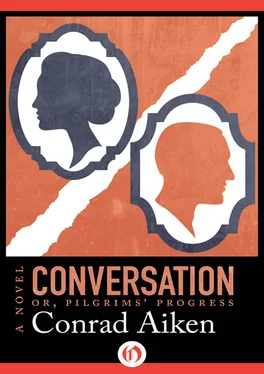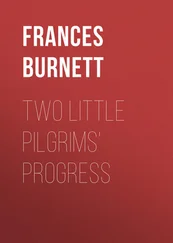“How so? I don’t know a thing.”
“You know he’s a thief! And we hear that he’s going to continue being a thief while he’s living here .”
“You know more than I do then!”
“I judge merely from what Enid said.”
“Enid’s only source of information, as far as I am aware, is myself.”
“Well, my dear fellow, you must realize what we feel about it. We can’t allow thieves around, you know — there is such a thing as law, after all! Just the same, I don’t want to be unreasonable, and as he’s a friend of yours, I thought it only fair to give you and him warning.”
“Warning?”
“Exactly. It will be my duty as a citizen to notify the police.”
(Damn! So that was what they were up to—! And Enid too.)
“Now look here, George—”
He broke off, gave an angry little laugh. It was funny — it was really too funny. The upright but misguided Jim — and yet, was he misguided? — causing all this fuss. And the idea of notifying poor old bewildered Uncle Cy William, the Town Constable, who had never made an arrest in his life! But George was leaning back in his chair, smiling cynically, his curled leonine head outlined against the open window — he was going to be difficult, he was going to be truculent. The defender of the faith — confound his impertinence! And the worst of it was that, within his limits, he was perfectly right.
George was saying, twirling the Panama hat round a raised forefinger:
“How long exactly have you known him, by the way, Tip? It isn’t as if he was really an old friend of yours, is it?”
“I think I told you. He came up to town with my friend Karl Roth, the painter — that was last spring. I liked him. He struck me at once as one of the few honest people I ever met.”
“Honest!”
“Yes. I mean it. The stealing is only an idea, a protest — he’s an anarchist and unlike most anarchists he practices what he preaches — doesn’t believe in trade for profit or in property being used for profit by barter. And so he steals merely in order to redistribute goods which he thinks are unjustly divided — he doesn’t make anything out of it himself — not a cent — gives it all away to the poor and deserving. With a special weakness for helping starving painters and poets.”
“And you believe that!”
“Of course I do. He’s perfectly candid about it — he even notifies the police himself, sometimes in advance, when he’s planning a haul, so as to get himself arrested and air his views in court. Sends the district attorney a picture postcard! They’re tired of him. They’d much rather look the other way, I can assure you! And he’s actually done a lot of good — he’s helped some of the poor creatures a great deal.”
“The whole thing’s a fake, my dear Tip, and I’m surprised you don’t see through it, I really am! Why, those dingy little poets and painters are nothing but parasites, it’s just a dishonest and easy living for the whole lot of them. Mind you, I don’t care what he does in New York or Greenwich Village — let him do it all he likes down there! But, by gosh, it’s another thing when he comes up here , and takes the most expensive cottage in town with his ill-gotten gains, and proposes to use this as his center of operations! That’s too much, yes, sir, that’s a bit too much.”
“You’re quite safe. He doesn’t rob houses, and you won’t miss any of your silver. You can reassure Mabel!”
“It doesn’t make any difference, as far as I can see, what he steals.”
“Only department stores. He specializes in robbing big department stores. I think it’s kind of nice, at that!”
“You’ve got a right to your own opinion, but, my dear boy, I beg you to consider your position very carefully. I don’t want to see you get into any trouble.”
“Who’s likely to make trouble?”
“ I am! And you can tell him that from me. And you can tell him he’d better keep out of my way. I don’t want to meet him. Nor his houseful of very peculiar-looking friends.”
“There’ll be no occasion, I assure you.”
“They all look like crooks to me!”
“They’re quite harmless, they’re just a little crazy.”
“Every man to his own taste, said the farmer, as he kissed the pig! Anyway, you tell your friend Connor that I’ve warned him, and that I reserve the right to inform the police without further notice. I trust that’s quite clear?”
“Quite, my dear George. I’ll take Connor your tender message. Not that he’s really a friend of mine — I hardly know him!”
“If you’ve got any sense, you’ll drop him. But I must be going.”
“I’ll walk down to the bridge with you.”
Good old George — so well-meaning, but such a righteous idiot! Hopeless to expect anything else of him, of course — one had only to look at the beautiful suit, the hat, the suède shoes, the neat black spectacle cord — but how damned exasperating. And what had he been saying to Enid? Or she to him? The thick was plottening, and with a vengeance, it looked like being a first-class mess. The property instinct — this was what came of owning a colonial mansion and a Pierce-Arrow car, by god! You couldn’t blame him, but all the same he was somehow less pleasant to consider than poor honest Connor, for all his crack-brained confusions and inconsistencies. Connor was at least generous.
They walked down the Town Landing lane in the dark. The big moon was just rising over the pine woods across the river, the crickets were chirping like mad, faster and faster, doubtless in a last passionate effort to keep themselves warm. Already the night smelt of frost. He turned his head, saw the dim light between the dining-room curtains — a shadow moved briefly across them, Enid must have decided to begin without him. But no — she was playing the piano; the little Brahms Op. 39 waltz came plaintively into the night, across the rustling of the trodden leaves and the iterated zeek-zeek-zeek of the doomed crickets — it was, of course, a protest. He smiled, and said:
“A pity you won’t meet them, though — Roth would amuse you. And those gals are a scream. Gosh , what a night!”
“Jove, yes! My dear fellow, of course there’s nothing personal in it, and I’m thinking as much of your good, yours and Enid’s and even Buzzer’s, as mine. A fine sort of scandal to get your family mixed up in! But never mind.… I hear your lilacs have come.”
“Yes. Terence is coming over to put them in before the frost.”
“You’ll have to get a move on. They’ll look well, all along that wall — you know, I often think of that little plum tree — wasn’t that the strangest thing you ever saw? Covered with blossom, not an inch of branch that wasn’t covered with blossom, and then dead so soon after — a week, was it?”
“One week. A suicide, if there ever was one. Why the devil should it want to commit suicide?”
“Oh, well, my dear boy, there are more things in heaven and earth — a good way to die, though.”
A little smug, a little suave — but sincere, too, it was old George’s attempt at amends, and had better be accepted as such. A car was rattling over the loose boards of the bridge, the headlights shot up the sandy rise of the road, throwing the heaped leaves into brilliant relief. Yes, the little plum tree — how beautiful it had been and how touching — he remembered just exactly how it had looked, remembered it with a pang, for now it must be uprooted, thrown away. Poor little thing.
“Well, good night, I must turn back. Ee will be waiting.”
“Good night, old man, and don’t take it too unkindly of me.”
Читать дальше












